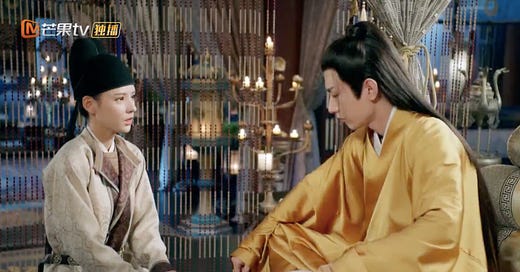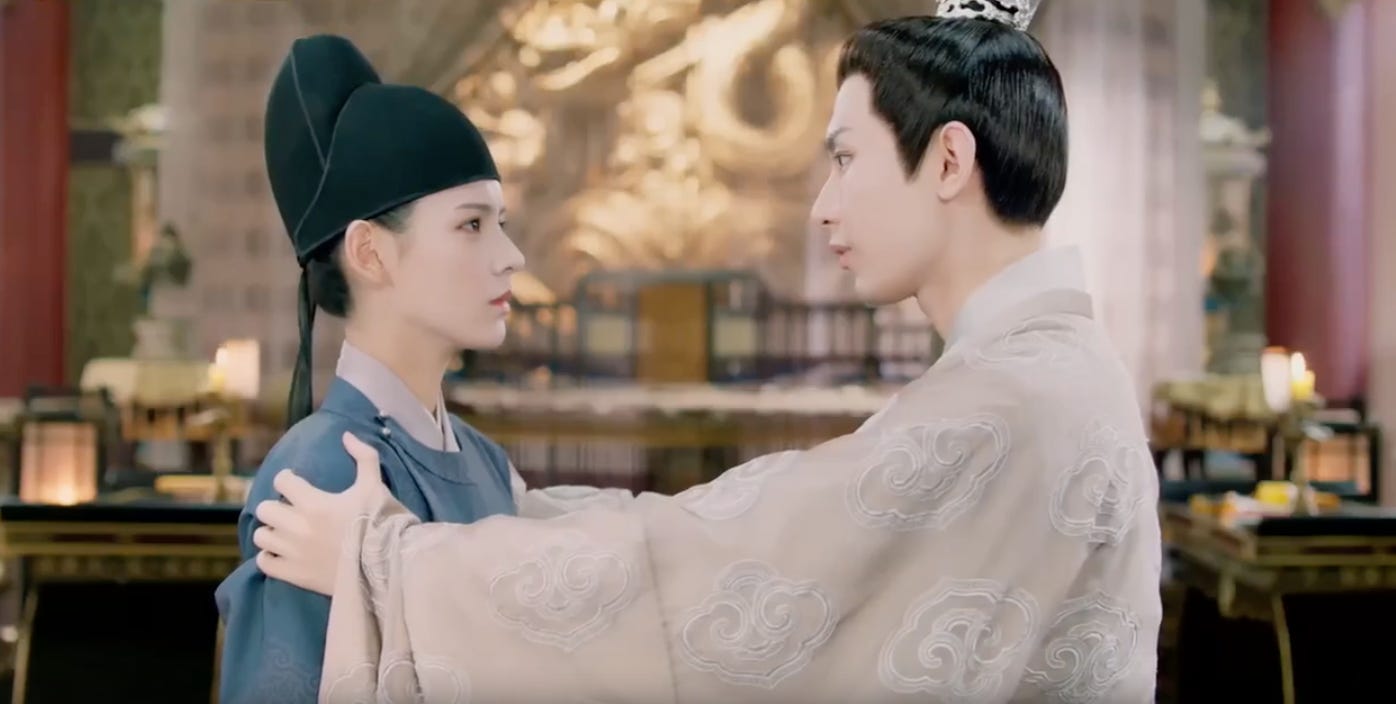One of the show’s main themes (and a personal favourite) is the compelling insight that individuals with overlapping goals often work against one another to their detriment. The fact that they should but are unable to sustain a united front in their efforts for a worthy (or even a noble) cause is why the kingpin of villainy in this particular context keeps gaining the upper hand. There’s little doubt as to who the villain is — Qiu Ziliang — a powerful eunuch who controls the royal court and the largest army in the land. Also to his advantage is the fact that there are plenty of who will do his bidding because they wish to “borrow” the power he wields for their own ends. He is the obvious face of evil because of the flow-on effects of one man having too much power for its own sake. Garnering power has been for his own political survival and not for the flourishing of the populace at large. As long as he’s the one calling the shots, what happens to the common folk is a mere triviality. It’s a game to him. An extended chess game where he holds all the aces (to mix metaphors here) for now.
The problem with riding on the coattails of the incarnation of evil in any scenario though helpful in the short-term comes with an incredibly high price tag in the bigger picture. The smart men and women understand the pragmatic necessity of kowtowing to the big man in order to undermine evil from the inside. Hence they act accordingly with devastating consequences not just for their own moral bearings but for others who are caught in the relentless crossfire of the power plays.
The fact that the enemies of Qiu Ziliang have competing agendas prolongs the possibility of a decisive resolution to a common goal. Qiu Yanshi aka Wang Ruoqing wants revenge for her slain family post-Morning Dew Rebellion. The youngish emperor Qi Yan is on a mission to regain power and maintain the royal bloodline in earnest. The people are suffering under the yoke of the eunuch’s political whims. Prince Guang, uncle of the emperor, is the idealist who wants stability for the country. He’s a possible contender for the throne and there are those around him who will do whatever it takes to put him there even while he himself might be relegated to the role of bystander. That complicates matters and leads to even more arguably needless bloodshed. The fact that the endgame has to look a certain way to certain vested interests is why the eunuch’s head remains intact. His enemies are far too busy fighting each other and obstinately pushing their agendas to notice that he’s snickering all the way to the royal court.
A good example of this is Cheng Xi formerly the head of the Violet Bureau who ambitiously wants to unseat the incumbent Qi Yan and put her enigmatic brother on the throne. To do this she betrays the emperor and his sword bearer Cheng Ruoyu and hands a key individual to Qiu Ziliang on a platter at an opportune moment which could have weakened his grip on power. It seems counterintuitive on some level but she can’t bear the thought that Qi Yan could regain power so she makes the calculation that it’s better for Qi Yan not to have any kind advantage in the short-term and maintain the status quo. Her narrowly focused obsession with changing the ruling head of state and the belief that that will change everything for the better is what allows Qiu Ziliang to remain relatively unscathed. Her disruptive, reckless presence in the narrative doesn’t just create mayhem the object of her wrath but for the brother that she cherishes and ultimately for herself. Furthermore her slide into rock bottom of the pit of depravity is well documented here once she latches on to the principle that the end justifies the means.
This is true also of Qiu Yanzhi although to a lesser degree. Her revenge agenda is what causes her to further spiral downwards into moral deterioration. There’s no doubting her intelligence in the way she maneuvers in and out of sharp corners but her persistent reliance on Qiu Ziliang is a corrupting force. Compared to Cheng Xi she’s more fortunate in that she is stopped in her tracks as she discovers the identity of her younger sister who has been right under her nose the entire time. That discovery is her turning point from being completely consumed by revenge and being overwhelmed by the mire. A member of her family has been found and this member has remained unaffected by the moral decay that has tainted everything else. It takes her long time to come to the place where she realises the solution isn’t her succeeding but working in concert with everyone including the much maligned Qi Yan to change everything for the better.
In the midst of all this, Cheng Ruoyu is something of a beacon. Her importance in the narrative cannot be overestimated to my mind. She is a conduit and a rallying point in a climate of profound suspicion. Although the enemies of Qiu Ziliang are many they are hapless against him and seem incapable of banding together for a common cause because of a lack of trust. With the appearance of Cheng Ruoyu there are gradual shifts towards collaboration. What appears to be serious flaws in this cut-throat game are the means by which she not only secures the love of the people around her but their trust.
All throughout the series there have been gags about her martial arts deficiencies and her inability to protect the emperor even while officially she’s the sword bearer. It becomes increasingly obvious that as sword bearer her role is to bring people with disparate interests to the table of cooperation. She’s Qi Yan’s spokesperson as it were as well as his eyes and ears. They might not think much of Qi Yan but they are forced to wonder if there might be more to him than meets the eye especially if he’s risking life and limb for her and vice versa. There’s a powerful moment in Episode 44 in the aftermath of a major confrontation between the sisters where Yu’er says to Qi Yan haltingly, “Your Majesty, do you still not trust me?” In response he says to her, “Yu’er, you need to calm down. In this world you are the person I trust the most. Trust me, Yu’er.” From the mouth of the lonely, often distrustful Qi Yan those words are a reward for a devoted sword bearer like no other. Love is the engine but trust is the vehicle for a resolution long time in coming.
The moral of the story here is that trust is a currency that silver and gold cannot buy. It is earned and forged through blood, sweat, tears… and love. Intelligence is a dime a dozen. There’s plenty of that to go around in this chess game. The missing ingredient all this time hasn’t been a lack of brain power but trust. Without it, there can be no collaboration, belligerent or otherwise. Without collaboration there can be no triumph over evil.











Sorry for being late. I totally agree with you. Trust and loyalty are the main characters in this story and how these factors play with every truth or motive that everyone has (Qiu Ziliang is the exception to these case).
At some point, most of the characters in some way are portrayed as villains but had one part of truth. In the end this is what determines which persons can I align and join forces to what is right.
I must say that in several moments of this drama it had me thinking really hard, specially the third person due to the many desires and objectives that all characters had. It was a good drama till the end.